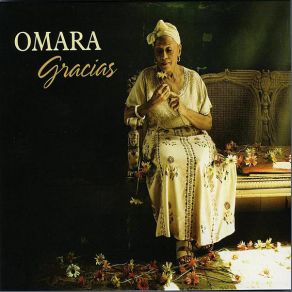Gracias
Download links and information about Gracias by Omara Portuondo. This album was released in 2008 and it belongs to Salsa, Latin genres. It contains 13 tracks with total duration of 45:51 minutes.

|
|
|---|---|
| Artist: | Omara Portuondo |
| Release date: | 2008 |
| Genre: | Salsa, Latin |
| Tracks: | 13 |
| Duration: | 45:51 |
| Buy it NOW at: | |
| Buy on iTunes $9.99 | |
| Buy on Amazon $8.99 | |
Tracks
[Edit]| No. | Title | Length |
|---|---|---|
| 1. | Yo Vi | 3:14 |
| 2. | Adiós Felicidad | 3:15 |
| 3. | O Que Será (Con Chico Buarque) | 3:46 |
| 4. | Vuela Pena | 4:35 |
| 5. | Cuento para un Niño | 4:21 |
| 6. | Ámame Como Soy (Con Pablo Milanés) | 3:26 |
| 7. | Tú Mi Desengaño | 3:54 |
| 8. | Cachita | 1:20 |
| 9. | Rabo de Nube | 3:21 |
| 10. | Gracias (Con Jorge Drexler) | 3:25 |
| 11. | Nuestro Gran Amor (Con Cachaito Lopez y Chucho Valdés) | 4:11 |
| 12. | Lo Que Me Queda por Vivir | 3:29 |
| 13. | Drume Negrita (Con Richard Bona) | 3:34 |
Details
[Edit]Who says you can't teach an old diva new tricks? At 78, Omara Portuondo, the Cuban vocalist who had nearly settled into retirement before the advent of the Buena Vista Social Club in the late '90s gave her international recognition, makes a bold move with Gracias. Although Portuondo's Cuban roots are evident throughout — as if she could ever lose them — the singer looks toward Brazilian forms, into jazz and beyond for this collection, produced by Brazilians Alé Siqueira and Swami Jr. And if Portuondo sounds closer to 48 than her actual age, it's easy to imagine that was part of the plan: there is a barely contained youthful spryness to her delivery of this material, an implicit statement that Portuondo is thrilled to be stepping out of the proverbial box in which she's lived — metaphorically speaking — for the better part of a half-century. To drive the point home, the producers have recruited an all-star support team boasting wide credentials: Israeli-born jazz double-bassist Avishai Cohen and Cameroonian bassist Richard Bona, Indian percussionist Trilok Gurtu, and vocalists Chico Buarque (from Brazil) and Jorge Drexler (Uruguay) are among the contributors, as are Cubans Pablo Milanés (vocals), Chucho Valdés (piano), Roberto Fonseca (keyboards), percussionist Andres Coayo and producer Swami Jr., who provides the rich acoustic seven-string guitar on several tracks. A string section adds sweetening here and there, and Rossio Jiménez shares vocals with her grandmother on one track, the quasi a cappella "Cachita" — the album's only true clunker. From the sparingly orchestrated lead track, Henri Salvador's ballad "Yo Vi," and its successor, "Adiós Felicidad," which allows Cohen a generous solo spot, it becomes apparent that Portuondo is looking to spread her wings here. On "Rabo de Nube," amidst Cohen's bass bowing, Fonseca's broad sweeps of piano and Fender Rhodes, the seven-string, and Gurtu's tablas, Portuondo emotes with gusto but not in an over the top manner. Rather she eases into her vocal, before letting herself drift along with the cresting wave that the song becomes. On the sprightly "Ámame Como Soy," Portuondo rides atop the rhythm, presenting the Spanish lyrics — in a duet with Milanés — in a singsongy voice that manages to avoid the melodramatic flourishes another, less experienced singer might have injected. A variety of moods and sonic approaches lend the album its diverse flavors — stark drumming here, a rush of strings there — and while Portuondo does at times lapse into the saccharine, those lapses are forgivable in a set that recharges the career of a singer who could easily have coasted for the rest of her life.